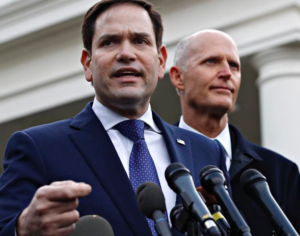By John Haughey
The Center Square
December 30, 2020

Count Florida U.S. Sen. Marco Rubio among Republicans who support President Donald Trump’s demand to increase pandemic relief payments from $600 to $2,000 for eligible adults.
“I share many of my colleagues’ concerns about the long-term effects of additional spending, but we cannot ignore the fact that millions of working class families across the nation are still in dire need of relief,” Rubio said in a statement after the U.S. House voted, 275-134, to approve the $464 billion CASH Act, reflecting Trump’s 11th-hour demand for bigger COVID-19 relief payments.
But there’s a catch.
Rubio said he also will introduce a proposal to amend Section 230 of the Communications Decency Act, which provides liability protections to websites that allow third-party users to post content.
Trump and conservatives have railed against what they call “censorship” by online social media platforms that remove posts regarded as misinformation or label them as such.
Rubio is expected to file the measure to “protect small businesses and companies that promote free speech on the Internet” but removes “immunity” for certain technology platforms.
“I also stand ready to work with my colleagues to make much-needed changes to Section 230 and take steps to ensure the American people can once again have confidence in our elections,” Rubio said.
Senate Majority Leader Mitch McConnell, R-Kentucky, blocked a vote on the CASH Act on Tuesday, delaying – and, perhaps, avoiding – a vote that could pit Republicans against the outgoing president as he mounts a last-ditch effort to negate the November presidential election won by Democrat Joe Biden.
Among ways McConnell may dodge such a confrontation is by larding the CASH Act with Republican priorities, such as amending Section 230, as Rubio proposes.
Florida’s junior Republican senator, former Gov. Rick Scott, was one of six GOP senators to vote against the original $900 billion stimulus package but has been mum on how he’ll vote on the CASH Act.
After the Senate approved the $900 billion package last week, Scott reiterated his long-held philosophical opposition.
“We are not spending money we have in the bank or anticipate we will collect in taxes. Washington doesn’t seem to understand that new spending today will be paid for by increased federal debt and result in a tax increase on families down the road,” Scott said in a post-vote statement. “We have to stop operating this way; there is no excuse for the way Washington treats the American taxpayers. I’ve repeatedly voted against enormous and wasteful spending bills. The easy route is simply to go along as Congress continues to do harm to future generations of Americans, but I will not be a part of it.”
When, or if, the CASH Act vote occurs remains uncertain.
“This week,” McConnel said Tuesday, “the Senate will begin a process to bring these three priorities into focus.”
Eight of Florida’s 14 GOP congressional representatives voted against the CASH Act on Monday, with Republicans Mario Diaz-Balart, Francis Rooney and John Rutherford breaking ranks.
“Last night I supported an additional stimulus payment of $2,000 for the hard-working Americans suffering financially from the deadly Covid virus,” tweeted Rooney, who is retiring. “Thank you [House Speaker Nancy Pelosi] for swiftly bringing this to the House floor. It is my hope that [McConnell] will do the same in the Senate.”
Republican U.S. Rep. Greg Steube said he voted against the CASH Act because it’s an “unnecessary redistribution of wealth.”
“Americans don’t need inadequate stimulus checks and forced government dependency to get them back on their feet,” Steube said. “We need efforts to safely reopen and return back to normal.”

This POS needs to go away.